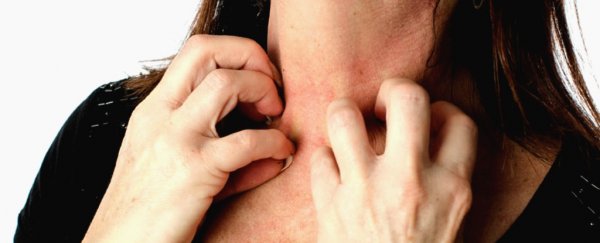Having an itch is an intense and frustrating experience - especially if scratching just makes it worse.
But there are certain disorders that actually result in people itching uncontrollably without relief. In one case study, a woman had such an itchy scalp she scratched through to her brain.
So how do these disorders originate? It all comes back to why we itch in the first place, as this video from It's Okay To Be Smart explains.
Itching is an incredibly strange sensation that scientists still don't fully understand.
The itch sensation is technically known as pruritus, and it's thought to have evolved as a way to protect skin - our largest organ - from parasites and build-up of dead cells.
After all, all our other organs are tucked away safely inside our bodies, where they can be fully protected by the immune system. But our skin is our first line of defence, constantly in contact with the outside world, so it makes sense it evolved some unique ways to stay intact.
It also explains why itching is contagious - back in the palaeolithic days when we all lived in close quarters, if you saw an infested tribesmate scratching away at themselves, it would make sense that you should start scratching too, in order to avoid being bitten or infected by whatever was bothering them.
But it doesn't explain why an itch produces such a unique and maddening sensation.
As the video explains, up until a decade ago scientists actually thought an itch was just another, milder type of pain - using the same receptors in the epidermis that relay chemical and electrical messages up the spine and to the brain to tell it something hurts.
But we now know that itching actually has its own specific circuitry, involving its own chemicals and cells.
And while we all have different responses to pain, we share a universal response to itching.
Scratching.
It turns out scratching feels so good because it causes a low-level pain signal to shoot up to the brain and override the itch signal to provide us with relief. That's why pinching or slapping the itchy spot can work, too.
Unfortunately, some of those relieving chemicals, including serotonin, can actually make it easier for the itch signal to be re-triggered.
That's why it's common for scratching to make you more itchy, kicking off a vicious cycle scientists call the itch-scratch cycle.
Damage to the nerves involved in that cycle can result in uncontrollable itching, without any stimulus; when that happens, these are jointly known as pruritus disorders.
There are loads of reasons why these occur, and sometimes researchers don't even know the cause. Some can be caused by viral infections that affect the nervous system, such as postherpetic itch, which can be triggered by shingles.
There are also conditions such as brachioradial pruritus, which is caused by a restricted nerve in the neck. And aquagenic pruritus, which is itching experienced after contact with water. Some cases have actually been linked to a rare condition where the body has too many red blood cells.
All of these disorders can leave people with a frustrating itch, often without an obvious cause and potentially without relief, too.
In an extreme case study, a woman who'd suffered from shingles had such an itchy scalp that within a year she had "painlessly" scratched straight through her skull and into her brain.
So what can you do to relieve itching? We'll let you check out the video above to find out more, but the good news is there are several treatments to try.
Plus, scientists are still learning more all the time about our curious and unique itch response, so in the future we might finally be able to turn off uncontrollable itching for good.
